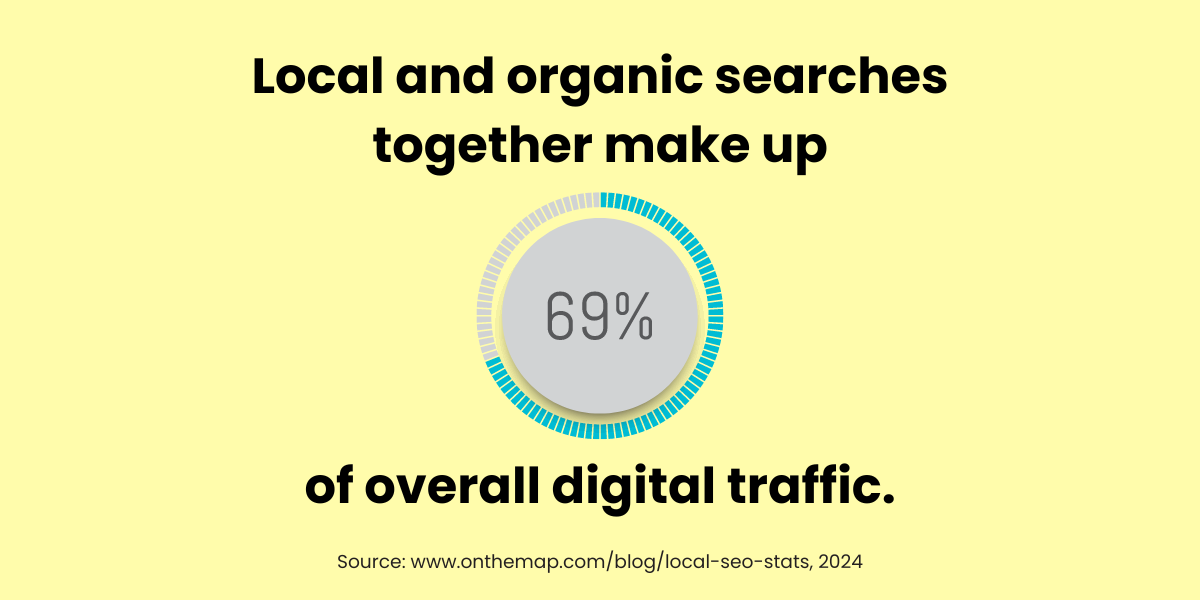Hey, divorce attorney – I know you’re eager to see your law firm succeed. The competition is no joke, but don’t let that discourage you. I’ve got a game-changer for you: local SEO for divorce attorneys. This incredible strategy can help you rise above the rest and get your phone ringing with calls from potential clients in your area who are in need of anattorney they can trust.
You might be thinking, “Local SEO for divorce attorneys? Isn’t that just for restaurants and coffee shops?” Nope, think again! Local SEO is crucial for divorce lawyers like you who want to dominate your local market. In fact, a whopping 96% of people seeking legal advice start their search online. That’s a lot of potential clients you could be missing out on if you’re not showing up in those local search results.
Local SEO for Divorce Attorneys: Why You Need It
In today’s digital world, having a strong online presence is crucial for divorce attorneys looking to attract new clients and grow their practice. When potential clients are searching for a divorce lawyer, they often turn to search engines like Google to find the best options in their area. This is where local SEO comes in.
Importance of Online Visibility for Law Firms
Online visibility is essential for law firms, especially those specializing in divorce and family law. A staggering 96% of individuals seeking legal help use search engines to find attorneys. If your law firm doesn’t show up in the top search results, you’re missing out on a huge opportunity to connect with potential clients. Here’s why:
- The Power of Search Engines: Your point about search engines is key. With a whopping 96% of potential clients turning to them, if your firm isn’t ranking high, you’re essentially invisible to this vast audience. Imagine all those people needing legal guidance but simply never coming across your firm because they didn’t find you on the first page of search results.
- Competition is Fierce: Divorce and family law is a competitive field. By building a strong online presence, you’re increasing your chances of being seen over your competitors. Think of it as a crowded marketplace. If you have a bright, informative booth with a welcoming presence, you’re more likely to attract potential clients than if you’re hidden in a corner.
- Building Trust and Credibility: A well-designed and informative website can be a powerful tool for establishing trust and credibility with potential clients. By providing valuable content, such as blog posts on common legal issues or FAQs, you demonstrate your expertise and position yourself as a reliable resource. People going through a difficult time like a divorce need to feel confident in their attorney, and a strong online presence can be a big step towards building that trust.
- 24/7 Availability: Your website acts as your digital storefront, available to potential clients 24/7. This allows them to learn about your firm, your services, and your contact information at their convenience. In a time of crisis or emotional distress, this accessibility can be invaluable.
By investing in online marketing strategies like Search Engine Optimization (SEO) and developing a user-friendly website, divorce and family law firms can significantly increase their visibility, attract more clients, and ultimately grow their business.
Benefits of Local SEO for Divorce Attorneys
Local SEO isn’t just a buzzword for divorce lawyers – it’s a game-changer that can transform your online presence and attract a steady stream of qualified leads. Here’s how local SEO can supercharge your law firm’s digital strategy:
- Laser-Targeted Visibility: Forget going after broad, national keywords. Local SEO allows you to focus on location-specific keywords like “[city name] divorce lawyer” or “[county name] child custody attorney.” Imagine the difference between a billboard on a random highway and a targeted ad displayed on the local bus route most people in your area take. With local SEO, you’re ensuring your firm shows up at the precise moment potential clients are actively searching for a divorce lawyer in your area.
- Attract High-Intent Leads: People using location-specific keywords like “divorce lawyer near me” are much further along in the decision-making process compared to someone just browsing general legal information. These are qualified leads who are actively looking for an attorney in their area to handle their case. By appearing high in local search results, you’re positioning yourself to capture these high-intent leads at the exact moment they need your expertise.
- Building Local Credibility: When potential clients see your firm consistently ranking high in local search results for relevant divorce law keywords, it builds trust and credibility. Think of it like a local endorsement. People are more likely to trust a lawyer who appears established and readily available within their community. Local SEO helps you build that local authority and establish yourself as a go-to resource for divorce legal needs.
- The Competitive Edge: Many divorce lawyers neglect local SEO, leaving a golden opportunity on the table. By implementing a local SEO strategy, you gain a significant advantage over competitors who haven’t invested in this vital online marketing tool. It’s like having a prime location on the main street compared to being tucked away in a back alley. With local SEO, you put your firm in the spotlight and make it easier for potential clients to find you before they find the competition.
Key Elements of a Successful Local SEO Strategy for Divorce Lawyers
Now that you understand the importance of local SEO for divorce attorneys, let’s dive into the key elements of a successful local SEO strategy.
Optimizing Your Google Business Profile
Your Google Business Profile (formerly known as Google My Business) is one of the most important elements of your local SEO strategy. This free listing allows you to provide important information about your law firm, including your address, phone number, website, hours of operation, and more.
Optimizing your Google Business Profile involves:
- Claiming and verifying your listing
- Providing accurate and up-to-date information
- Adding photos and videos to showcase your law firm
- Encouraging clients to leave reviews
- Responding to reviews and questions in a timely manner
By optimizing your Google Business Profile, you can improve your chances of showing up in the local pack (the map listings that appear at the top of search results) and attract more potential clients to your law firm.
Creating a User-Friendly Website
Your law firm’s website is another crucial element of your local SEO strategy. A user-friendly website that is optimized for search engines can help you rank higher in search results and attract more potential clients.
Some key elements of a user-friendly website include:
- Fast loading speed
- Mobile responsiveness
- Easy navigation
- Clear calls-to-action
- High-quality, relevant content
By creating a website that is easy to use and provides valuable information to potential clients, you can improve your chances of ranking higher in search results and converting more visitors into clients.
Building Local Citations and Backlinks
Local citations and backlinks are also important for local SEO. Citations are online mentions of your law firm’s name, address, and phone number (NAP) on other websites, such as online directories and legal associations.
Backlinks are links from other websites that point back to your law firm’s website. These links act as “votes of confidence” and can help improve your website’s authority and ranking in search results.
To build local citations and backlinks, you can:
- Submit your law firm to online directories and legal associations
- Participate in local events and sponsorships
- Collaborate with other local businesses and organizations
- Create valuable content that other websites will want to link to
By building high-quality local citations and backlinks, you can improve your law firm’s online visibility and attract more potential clients.
Leveraging Customer Reviews
Customer reviews are a powerful tool for local SEO. Positive reviews can help improve your law firm’s visibility in search results and attract more potential clients.
To leverage customer reviews for local SEO, you can:
- Encourage satisfied clients to leave reviews on your Google Business Profile and other online directories
- Respond to reviews (both positive and negative) in a professional and timely manner
- Showcase positive reviews on your law firm’s website and social media profiles
By actively seeking out and managing customer reviews, you can build trust and credibility with potential clients and improve your law firm’s online reputation.
Key Takeaway:
Boost your divorce law firm’s game with local SEO. Make sure you’re the first choice for clients in your area by optimizing your online presence, from Google Business Profiles to user-friendly websites and leveraging customer reviews. It’s all about being visible where it matters most.
Optimizing Your Law Firm’s Website for Local SEO
As a divorce attorney, I’ve seen firsthand the power of local SEO in attracting clients. It’s not just about ranking for broad keywords like “divorce lawyer” – although that certainly helps. The real magic happens when you optimize for local search queries.
Think about it. When someone’s going through a divorce, they’re not looking for just any lawyer. They want someone nearby, who understands the local laws and can guide them through this tough time. That’s where local SEO comes in.
Conducting Keyword Research for Your Practice Area
The first step? Keyword research. You need to know what potential clients in your area are actually searching for. In my experience, long-tail keywords like “child custody lawyer in [city]” or “how to file for divorce in [state]” can be incredibly valuable. They may have a lower search volume, but the intent behind them is crystal clear.
Tools like Google Keyword Planner and Ahrefs can help you uncover these local gems. But don’t stop there. Look at the questions people are asking on forums and social media. These can spark ideas for content that directly addresses your target audience’s needs.
Creating High-Quality, Relevant Content
Once you have your keywords, it’s time to create content that will rank. And not just any content – we’re talking high-quality, relevant, and engaging blog posts, guides, and resources. The kind of stuff that makes Google sit up and take notice.
In my practice, we’ve seen great success with in-depth guides on state-specific divorce laws, blog posts answering common questions, and even video content featuring client testimonials. The key is to provide real value while naturally incorporating your target keywords.
But here’s the thing: quality matters more than quantity. Don’t churn out thin content just for the sake of having more pages. Google’s algorithms are smart, and they’re only getting smarter. Focus on creating the best resource on the web for your topic, and the rankings will follow.
Improving Website Structure and Navigation
Your website’s structure and navigation play a big role in local SEO, too. After all, what’s the point of creating great content if users can’t find it?
Ensure your site has a clear hierarchy, with pages organized by topic and location. Use descriptive URLs and title tags that include your target keywords. And don’t forget about internal linking – this helps search engines understand the relationship between your pages and can give important pages a boost.
For multi-location firms, consider creating separate pages for each office, optimized for local keywords. This not only helps with search rankings but also provides a better user experience for potential clients.
Implementing On-Page SEO Best Practices
Finally, don’t neglect on-page SEO. This includes things like optimizing your title tags, meta descriptions, header tags, and images for your target keywords.
I know, it sounds technical. But trust me, these small tweaks can make a big difference. Tools like Yoast SEO can help guide you through the process and ensure you’re ticking all the boxes.
Just remember: on-page SEO isn’t about keyword stuffing. It’s about providing a great user experience while signaling to search engines what your page is about. Keep it natural, keep it relevant, and keep your user’s needs front and center.
Building Local Citations and Backlinks for Your Divorce Law Firm
Optimizing your website is just the beginning. To really boost your local SEO, you need to build local citations and backlinks. Think of these as votes of confidence from other websites, telling Google that you’re a trusted authority in your area.
Identifying Relevant Local Directories
Start by claiming your listings on major local directories like Google My Business, Yelp, and Avvo. These are the heavy hitters that can really move the needle.
But don’t stop there. Look for niche directories specific to your location or practice area. For example, there might be a directory of family law attorneys in your state, or a local business association with a member directory. Getting listed in these smaller directories can still send valuable signals to search engines.
The key is consistency. Make sure your firm’s name, address, and phone number (NAP) are accurate and identical across all listings. Google uses this information to verify your location and legitimacy, so any discrepancies can hurt your rankings.
Securing Listings on Legal Directories
In addition to local directories, there are also plenty of legal-specific directories worth targeting. Sites like Justia, FindLaw, and Martindale-Hubbell can provide valuable backlinks and exposure for your firm.
Many of these directories allow you to create a detailed profile, showcasing your experience, practice areas, and even client reviews. Take advantage of this. The more complete and compelling your profile, the more likely you are to attract clicks and clients.
Just be sure to read the guidelines carefully. Some directories have strict requirements around things like formatting and linking. Follow the rules to avoid any penalties or removal of your listing.
Pursuing High-Quality Backlinks
Beyond directories, look for opportunities to earn backlinks from other high-quality, relevant websites. This could include guest posting on legal blogs, partnering with local organizations, or even earning media coverage for a high-profile case.
The key here is relevance and authority. A single backlink from a respected legal website is worth more than a dozen links from spammy, unrelated sites. Focus on building relationships and providing value, and the links will follow.
Collaborating with Local Businesses and Organizations
Finally, don’t underestimate the power of local collaborations. Partnering with other businesses and organizations in your community can lead to valuable backlinks and referrals.
For example, you might sponsor a local charity event, host a legal seminar for a business association, or contribute to a community newsletter. These activities not only build goodwill but also create natural opportunities for links and mentions online.
The beauty of local collaborations is that they often lead to ongoing relationships. That one sponsored event could turn into an annual tradition, with fresh backlinks and referrals year after year. It’s all about planting seeds and nurturing those connections over time.
Key Takeaway:
Boost your divorce law firm’s visibility by optimizing for local SEO. Start with detailed keyword research, focusing on what potential clients in your area are searching for. Then, create standout content that answers their questions and showcases your expertise. Make sure your website is easy to navigate, with a clear structure and optimized pages. Don’t forget about the power of local citations and backlinks from reputable directories and community collaborations to strengthen your online presence.
Leveraging Social Media for Local SEO and Client Engagement
Social media is a game-changer for divorce lawyers looking to boost their local SEO and connect with potential clients.
It’s not just about posting random updates and hoping for the best. There’s a strategy to it.
Establishing a Strong Social Media Presence
First things first, you need to establish a strong presence on the social media platforms that matter most to your target audience. For divorce lawyers, that typically means focusing on Facebook, LinkedIn, and Twitter.
Create profiles that showcase your expertise, experience, and unique value proposition. Use high-quality images and write compelling bios that speak directly to the needs of your ideal clients.
But don’t just set it and forget it. Consistency is key. Post regularly and engage with your followers to build trust and credibility.
Sharing Valuable Content and Insights
Here’s where the magic happens. To really leverage social media for local SEO and client engagement, you need to share valuable content that resonates with your audience.
Think blog posts, infographics, videos, and other resources that address the common questions and concerns of people going through a divorce. Share your insights on topics like child custody, property division, and the emotional challenges of ending a marriage.
But don’t just share your own content. Curate and share relevant articles and resources from other reputable sources in the family law space. This shows that you’re plugged into the latest developments and trends in your field.
Engaging with Your Local Community
Social media is all about building relationships and engaging with your local community. As a divorce lawyer, there are plenty of opportunities to do just that.
Participate in local Facebook groups and LinkedIn discussions related to family law and divorce. Share your insights and offer helpful advice (without giving legal advice, of course).
Attend local events and share photos and updates on your social media profiles. This shows that you’re an active and engaged member of your community.
Monitoring and Responding to Online Reviews
Online reviews are a crucial component of local SEO for divorce lawyers. They provide social proof and can heavily influence a potential client’s decision to reach out to your firm.
But here’s the thing: you can’t just sit back and hope for positive reviews to roll in. You need to actively monitor your online reputation and respond to reviews – both positive and negative.
Use tools like Google Alerts to get notified whenever your firm is mentioned online. Respond to positive reviews with a heartfelt thank you, and address negative reviews with empathy and professionalism.
By leveraging social media strategically, divorce lawyers can boost their local SEO efforts and engage with potential clients in a meaningful way. It’s all about building relationships and providing value – one post at a time.
Measuring the Success of Your Local SEO Efforts
Investing in local SEO is a no-brainer for divorce lawyers who want to attract more clients and grow their practice. But how do you know if your efforts are actually paying off?
That’s where measuring the success of your local SEO comes in. It’s not enough to just implement a few tactics and hope for the best. You need to track your progress and make data-driven decisions to optimize your strategy over time.
Setting Realistic Goals and KPIs
The first step in measuring the success of your local SEO is to set realistic goals and key performance indicators (KPIs). What do you want to achieve with your local SEO efforts? More website traffic? More phone calls? More client sign-ups?
Once you have a clear goal in mind, you can identify the KPIs that will help you track progress towards that goal. For example, if your goal is to increase website traffic from local searches, your KPIs might include:
- Organic search traffic from local keywords
- Click-through rates from search engine results pages
- Time on site and bounce rate for local visitors
Tracking Website Traffic and Rankings
Speaking of website traffic, that’s one of the most important metrics to track when measuring the success of your local SEO. Use tools like Google Analytics to see how much traffic your site is getting from organic search, and which pages are driving the most engagement.
You should also keep a close eye on your search engine rankings for key local keywords. Use a tool like Moz Local to track your rankings over time and see how you stack up against competitors.
Analyzing Conversion Rates and Client Acquisition
At the end of the day, the ultimate goal of local SEO for divorce lawyers is to acquire more clients. That’s why it’s crucial to track your conversion rates and client acquisition metrics.
How many of the visitors coming to your site from local searches are actually taking action, whether it’s filling out a contact form, calling your office, or scheduling a consultation? Use tools like CallRail to track phone calls and form submissions from your website.
Continuously Refining Your Local SEO Strategy
Here’s the thing about local SEO: it’s not a set-it-and-forget-it kind of deal. The search algorithms are constantly evolving, and your competitors are always looking for ways to outrank you.
That’s why it’s so important to continuously refine your local SEO strategy based on the data you’re collecting. If you notice that certain keywords are driving a ton of traffic but not converting, maybe it’s time to rethink your content strategy. If you’re getting a lot of phone calls but not many form submissions, maybe you need to optimize your contact page.
The key is to stay agile and adapt your strategy as needed based on the insights you’re gathering. By setting realistic goals, tracking the right metrics, and continuously optimizing your approach, you can ensure that your local SEO efforts are driving real results for your divorce law practice.
Key Takeaway:
Boost your divorce law firm’s local SEO and client engagement by nailing social media. Create engaging profiles, share valuable content, connect with your community, monitor reviews, and track the impact to grow your practice. Remember, it’s about building relationships one post at a time.
Conclusion
Local SEO for divorce attorneys isn’t rocket science, but it does require some know-how and elbow grease. By optimizing your Google Business Profile, creating a user-friendly website, building local citations and backlinks, and leveraging customer reviews, you can boost your online visibility and attract more clients in your area.
Imagine the stress of someone going through a divorce, desperately seeking a lawyer they can confide in. That’s where local SEO comes in – it’s not just about climbing search rankings, but about being there for potential clients during one of life’s toughest moments.
So what are you waiting for? Start implementing these local SEO strategies today and watch your divorce law firm thrive. And if you ever need a pep talk or some extra guidance, you know where to find me. Let’s do this!
Frequently Asked Questions About Local SEO for Divorce Attorneys
Why is local SEO important for law firms?
Local SEO is crucial for law firms as it enhances visibility among potential clients in their geographical area. By optimizing their online presence to appear in local search results, law firms can significantly increase the likelihood of being contacted by individuals seeking legal services nearby. This targeted approach not only improves traffic quality but also boosts conversion rates, making it an indispensable tool in a competitive market.
How much does lawyer SEO cost?
The cost of SEO for lawyers can vary widely based on factors such as geographic location, competition level, and the scope of services required. Generally, monthly expenses can range from $2,000 to over $10,000 for comprehensive strategies tailored to competitive markets.
What is SEO for Lawyers?
SEO for lawyers refers to the strategic optimization of a law firm’s online presence to enhance its visibility in search engine results. This practice involves tailoring website content, structure, and keywords specifically to legal services, aiming to attract more potential clients by ranking higher on search engines like Google. Effective SEO strategies include optimizing website metadata, producing quality content relevant to legal topics, and building authoritative backlinks that improve the site’s credibility and authority.










